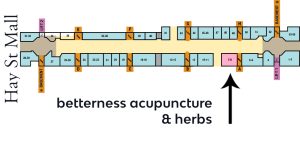
- Can acupuncture or Chinese herbal medicine help my condition?
Yes, probably.
According to our model of how the body works and how acupuncture and herbal medicine affect it, they can make some improvement no matter what condition you have. But in practice there are some things that they treat more effectively. Our methods are most appropriate when there is not a substantial physical pathology. For example when there is osteoarthritis of the knee with a high degree of cartilage loss, they may not repair the cartilage, but may be able to relieve pain and improve functionality.(1) My herbal gynaecology teacher saw thousands of women with endometriosis. His goal was not to eliminate the endometrial lesion, although sometimes they did resolve or get smaller (2), but to regulate those women’s periods and relieve the often debilitating pain.
The best way to find out if acupuncture or herbs can help you is to reach out to us, or book a free twenty minute consultation to discuss your condition. - Does acupuncture hurt?
In short, no.
It’s not like getting an injection or providing blood samples. Our needles are a fraction of the size of those used for injection, and have a rounded tip while injection needles have a sharp cutting edge. Sometimes there is a little pinch when a needle penetrates the skin but more often it won’t happen. - Is acupuncture safe?
Yes, when it is done by a qualified acupuncturist. Acupuncturists in Australia are registered and must have recognised degree qualifications and a minimum number of hours spent treating patients under supervision. But not everyone who does acupuncture is a registered acupuncturist, and many are not as qualified or well trained. Some call their acupuncture dry needling - How long will it take for me to get better?
That will usually depend on how long you have had the condition we will work on. Acute conditions that you have had for a few days usually respond quickly to treatment. But chronic conditions may take a while. A rough metric is a month of treatment for every year a person has had a condition. It’s not a rule, more a way of saying that healing can take time. Best to come to see us earlier. - Does Chinese herbal medicine taste bad?
Yes, nearly always.
Some herbs taste better than others. But while some are quite sweet and tasty like licorice, red dates, or cinnamon, there isn’t ever going to be Chinese medicine flavour icecream. However people often start to accept or even enjoy the taste once they associate it with getting better. - Is Chinese herbal medicine safe?
Yes, when it is prescribed by a qualified professional.
Just like pharmaceutical drugs, there are herbal medicinals that should be used carefully and that may have side-effects if they aren’t. So see a registered Chinese Herbalist instead of buying things recommended by Dr Google. - Some clinics have long lists of the things they can treat. Why don’t you?
Because we are following the rules.
Registered health practitioners in Australia cannot claim that they can successfully treat a clinical condition unless they can provide high quality evidence to support that claim.
This applies to all health practitioners, conventional as well as allied or ‘alternative’.
The high level of evidence required is very expensive in terms of people, resources, and money, and so is less often done for natural therapies that cannot be patented or monetised. That doesn’t mean these therapies don’t work, just that nobody has produced high enough quality evidence to claim that they do. A great deal of what conventional doctors and specialists do is not supported by such high quality evidence but is recognised as being standard practice by these professionals. And that is fine, the acquired knowledge of experienced health professionals is a sound basis for determining what treatment a condition requires. But is not sufficient for making a claim about successful treatment in a public domain that could be considered advertising. - Where are you?
Suite 8 London Court. This is on the second floor, and accessed via Stairwell A.

There are eight stairwells and two lifts in this weird old place – only Stairwell A takes you to the clinic.
Here’s a map, just call if you can’t find us.
(1) While they do not prove clinical effectiveness, some small studies have shown that acupuncture may repair knee cartilage. e.g.
(2) Though this sometimes happened after treatment with acupuncture and herbs, without clinical trials to provide a high standard of evidence, nobody can claim that it was because of the treatment.